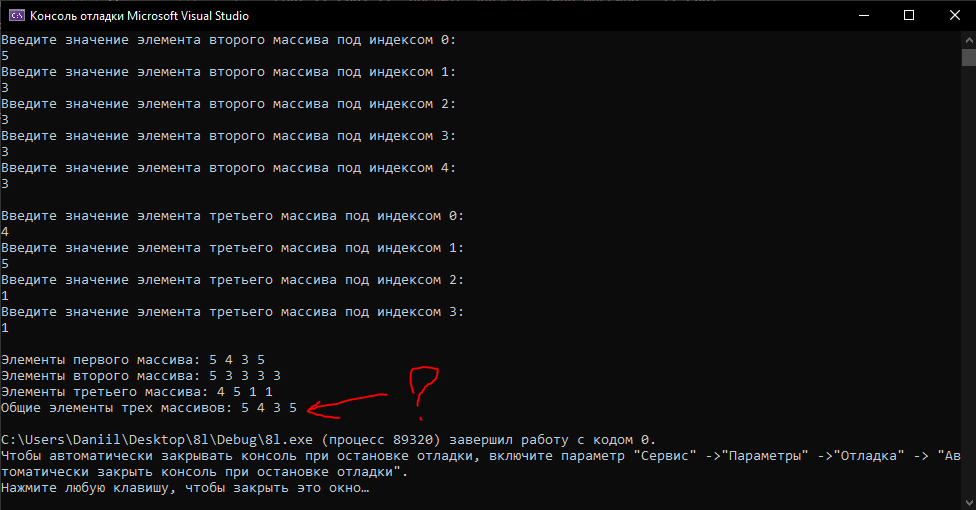Answer the question
In order to leave comments, you need to log in
How to find common elements in three arrays?
We need to modify the passForCommonElements() function so that it finds and displays the common elements of the three arrays once.
#include<iostream>
using namespace std;
template < typename T>
void passForCommonElements(T array1[], T array2[], T array3[], int size1, int size2, int size3) //поиск и вывод общих элементов массивы
{
T* arrayCommonElements = new T[size1]();
int g = 0;
int i = 0;
int j = 0;
int k = 0;
int p = 0;
while (g)
while (g < size1)
{
while (i < size1)
{
j = 0;
while (j < size2)
{
if (array1[i] == array2[j])
{
k = 0;
while (k < size3)
{
if (array1[i] == array3[k])
{
p = 0;
while (p < size1)
{
if (array1[i] != arrayCommonElements[p])
{
arrayCommonElements[g] = array1[i];
}
p++;
}
}
k++;
}
}
j++;
}
i++;
}
}
int h = 0;
cout << "Общие элементы трех массивов: ";
while (h < size1)
{
cout << array1[h] << " ";
h++;
}
cout << endl;
delete[] arrayCommonElements;
}
template < typename T1>
void outputElements(T1 array1[], T1 array2[], T1 array3[], int size1, int size2, int size3) //поиск и вывод общих элементов массивы
{
int i = 0;
cout << "Элементы первого массива: ";
while (i < size1)
{
cout << array1[i] << " ";
i++;
}
cout << endl;
i = 0;
cout << "Элементы второго массива: ";
while (i < size2)
{
cout << array2[i] << " ";
i++;
}
cout << endl;
i = 0;
cout << "Элементы третьего массива: ";
while (i < size3)
{
cout << array3[i] << " ";
i++;
}
cout << endl;
}
void inputElementsFloat(float* array1, float* array2, float* array3, int size1, int size2, int size3)
{
int i = 0;
while (i < size1)
{
cout << "Введите значение элемента первого массива под индексом " << i << ": " << endl;
cin >> array1[i];
i++;
}
cout << endl;
i = 0;
while (i < size2)
{
cout << "Введите значение элемента второго массива под индексом " << i << ": " << endl;
cin >> array2[i];
i++;
}
cout << endl;
i = 0;
while (i < size3)
{
cout << "Введите значение элемента третьего массива под индексом " << i << ": " << endl;
cin >> array3[i];
i++;
}
cout << endl;
}
void inputElementsInt(int* array1, int* array2, int* array3, int size1, int size2, int size3)
{
int i = 0;
while (i < size1)
{
cout << "Введите значение элемента первого массива под индексом " << i << ": " << endl;
cin >> array1[i];
i++;
}
cout << endl;
i = 0;
while (i < size2)
{
cout << "Введите значение элемента второго массива под индексом " << i << ": " << endl;
cin >> array2[i];
i++;
}
cout << endl;
i = 0;
while (i < size3)
{
cout << "Введите значение элемента третьего массива под индексом " << i << ": " << endl;
cin >> array3[i];
i++;
}
cout << endl;
}
int main()
{
setlocale(LC_ALL, "ru");
int k, m, n;
int arrayType;
cout << "Введите размер первого массива:" << endl;
cin >> k;
cout << endl << "Введите размер второго массива:" << endl;
cin >> m;
cout << endl << "Введите размер третьего массива:" << endl;
cin >> n;
cout << endl << "Введите значение типа массива:" << endl;
cout << endl << "0 - float";
cout << endl << "1 - int" << endl << endl;
cin >> arrayType;
if (arrayType)
{
int* array1 = new int[k];
int* array2 = new int[m];
int* array3 = new int[n];
inputElementsInt(array1, array2, array3, k, m, n);
outputElements(array1, array2, array3, k, m, n);
passForCommonElements(array1, array2, array3, k, m, n);
delete[] array1;
delete[] array2;
delete[] array3;
}
else
{
float* array1 = new float[k];
float* array2 = new float[m];
float* array3 = new float[n];
inputElementsFloat(array1, array2, array3, k, m, n);
outputElements(array1, array2, array3, k, m, n);
passForCommonElements(array1, array2, array3, k, m, n);
delete[] array1;
delete[] array2;
delete[] array3;
}
return 0;
}
Answer the question
In order to leave comments, you need to log in
Here is the shorter code:
#include <iostream>
template <typename T>
void commonElem(T a[], T a2[], T a3[], int len, int len2, int len3) {
std::cout<<"Common elements arrays is: ";
for(int i{0}; i < len; ++i) {
bool f2{false}, f3{false};
for(int j{0}; j < len2; ++j) if(a[i] == a2[j]) f2 = true;
for(int k{0}; k < len3; ++k) if(a[i] == a3[k]) f3 = true;
if(f2 && f3) std::cout << a[i] << ' ';
}
}
int main() {
int arr[]{23,12,54,2,7}, arr2[]{2,23,1,65}, arr3[]{43,2,76,4,23,8,96};
int l = std::size(arr), l2 = std::size(arr2), l3 = std::size(arr3);
commonElem(arr, arr2, arr3, l, l2, l3);
return 0;
}Didn't find what you were looking for?
Ask your questionAsk a Question
731 491 924 answers to any question